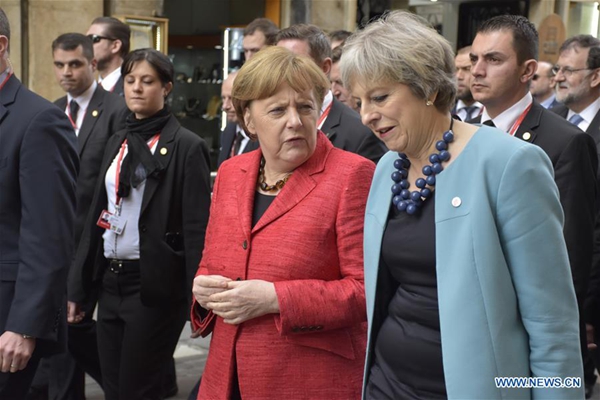The coming confrontation with Germany
china.org.cn / chinagate.cn by Sumantra Maitra, February 13, 2017 Adjust font size:
|
|
|
German Chancellor Angela Merkel (2nd R) and British Prime Minister Theresa May (1st R) talk to each other after the first round table discussion of the EU informal summit in Valletta, Malta, Feb. 3, 2017. (Xinhua/Mark Zammit Cordina) |
Around October last year, I started to write an essay on the lack of discussion and debate regarding post-Brexit strategy. The reason I felt this question was important is due to a feeling that there is frankly no way a "soft Brexit" will happen, and we're going to eventually see a more confrontational EU, not just towards the U.K., but also the U.S.
Even though no one seriously considered a Trump presidential victory last November, the public dissatisfaction and various trends were evident on both sides of the Atlantic. At that point, I had no idea how this confrontation would play out; instead, on the basis of patterns and trends and other unknown variables, there were only probabilistic answers.
However, the potential for Brussels and Berlin to settle into a siege mentality with nationalistic overtones was obvious. And in situations like that, theories regarding international relations could only point to a grim future, and completely new world order.
When an economic giant and quasi-super state with a distinct ideology and nerve center but with failing policies and internal dissent faces antagonistic forces, there's a distinct possibility of unpleasantness.
In my analysis, which finally got published in November, I noted a probable future, where U.K., U.S. and Russia, alongside other nationalistic forces would become aligned against a globalist EU led by Brussels and Berlin. The first two weeks of the Trump administration have not been kind to American allies, and have done nothing to ease that fear.
President Trump and his supporters threatened Mexico with invasion, humiliated Australia over a refugee swap deal, threatened Iran with war, and botched its way into the conflict in Yemen. Surprisingly, China has been off-limits for the time being.
However, the biggest threat from Trump was perhaps towards Germany. Trump, ever since he came to power, has made clear his displeasure towards the EU. German Chancellor Angela Merkel was a person of especial contempt for Trump.
There are traditional displeasures regarding military affairs and NATO; added to that, Trump's cabinet recently accused Germany of currency manipulation. According to the U.S. Treasury Department, Germany has devalued its currency, which is increasing its natural competitive advantage in exports. Germany of course vehemently denied it.
There's a pattern here, which historians and grand strategists might have observed. Peter Hitchens lectured about this at England's Keele University last year. The fundamental argument goes like this: Germany is too big for Europe, but too small to rule the whole world. Germany is also, since the time of Bismarck in the 19th century, a natural leader and central power right at the heart of Europe, the only realistic power to rule such a vast land.
This inherent contradiction is why Europe has repeatedly found itself in conflict. The German idea of dominating Europe militarily all but collapsed in 1945. But Germany's overall grand strategy has remained, taking the form of economic hegemony post-German unification and EU formation.
Parallel to this is a constant social force of external powers trying to control Europe. First, it was the British Empire and Imperial Russia, and now it's U.K., U.S. and Russia in loose alliance. This is in line with traditional international relations theory. Whenever a significant superpower or political entity rises within Europe, it inevitably attracts external powers to balance it.
The present situation is no different. There's a possibility of China and U.S. coming to a cold peace, even during the most trying times, precisely because the rivalry will be limited to geopolitical considerations. There will be mutual understanding of each other's needs and interests, if the channels of communication are open; a cautious measured and respectful distance will be maintained.
However, the rivalry between the U.K., the U.S., Russia and the EU is not geopolitical, but ideological. On one hand, we have nationalist forces, in the three major powers; on the other hand, we have an activist supranational entity with an ever closer union and specific set of ideas and values. It is difficult to expect coexistence.
And that's where my argument from last year seems to be coming painfully true. At that time, it was just U.K. post-Brexit; now, the U.S. is added to the mix. The EU naturally feels threatened, hence my expectation of possible confrontation.
Sumantra Maitra is a columnist with China.org.cn. For more information please visit:
http://www.china.org.cn/opinion/SumantraMaitra.htm
Opinion articles reflect the views of their authors only, not necessarily those of China.org.cn.
